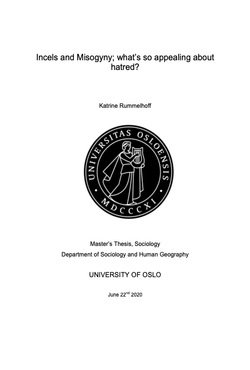By Katrine Rummelhoff
This thesis addresses the, now infamous, incel community. The term Incel is an abbreviation of “involuntary celibate”, and is defined by the incel community, as a person who desires, but is unable to obtain a romantic or sexual relationship. Over the last decade incels have gained notoriety due to the unabashed misogynistic rhetoric that is cultivated within the online communities they have created for themselves. Additionally several mass killers have been linked to the group, and as a whole the community is said to be responsible for a death toll of over 47. As such incels have been designated a domestic terrorism thereat by, among others, International Center for Counter Terrorism and The Texas Department of Public Safety. Yet, there is still much that remains unknown about incels and the online world they have created for themselves. In order to broaden this understanding I have performed a netnographic (Kozinets 2010, 2015) study of the website incels.co, an international forum site exclusively catering to self-proclaimed incels, and dedicated to the discussion of inceldom. Through daily observation of the site and an analysis of over 100 forum threads I have tried to determine the overarching values, beliefs, worldviews, and ideologies present within their discourse. Further, this study attempts to create an understanding of the appeal this community has to its members. The material collected in this study is first placed within its historical, cultural and material context, in order to understand the circumstances surrounding the resurgence of male supremacist ideology in online spaces. Subsequently the data from incels.co is analyzed using political, sociological and psychological theories on radicalization, evaluating the claim made by others that incel terrorism is a growing threat. Findings indicate however, that although the incels.co community is engaging in a radicalization of beliefs there is insufficient evidence to support a radicalization of behaviors. To make sense of the structure and organization that facilitates the radicalization of beliefs, the incels.co community is then examined through a subcultural lens. Finding that the site offers a succinct sense of subcultural belonging, providing a community of shared identity, shared meanings, countercultural values, and guidelines and justifications for behavior. Yet, it is also apparent that the notion of involuntary celibacy extends beyond this subculture, and as such I make the claim that not all incels are subcultural, but that a distinct incel subculture exists. Lastly, this study looks at the collectivist aspects of the incel community and makes the claim that incels.co functions as a platform for extremist beliefs to be cultivated and subsequently internalized by its users. With the help of Interaction Ritual Theory (Collins 2004) the interplay performed online is seen as a ritual engagement, where users will entrain around central ideas and objects, resulting in an experience of collective effervescence, emotional energy and group solidarity. Through such collective focus, ideas, beliefs, moral codes, myths and sacred objects pertaining to women, social hierarchies, and sexuality are cultivated and become part of the groups’ social reality. Overall, this thesis uses theories on radicalization, subculture and interaction ritual in order to make the claim that the incels.co platform is hosting an extremist collectivist subculture that experiences radicalization through a collective entrainment around sacred objects. In doing so this thesis provides new dimensions to work on radicalization as it places an emphasis on shared and collective processes in the cultivation of radical and extremist beliefs.
Oslo: University of Oslo, 2020. 101p.





